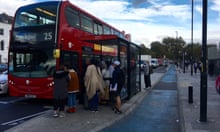As the lights change, the thundering morning traffic comes to a stop at one of London’s busiest junctions. Hundreds of people on bikes seize their chance and stream across the seven-lane intersection before disappearing into the relative safety of the UK’s first ultra-low emission area.
The network of streets in east London has become a haven for cyclists and pedestrians since two local councils banned all petrol and diesel cars, vans and lorries during morning and evening rush hour.
The aim, in one of the most polluted areas of the capital, is to “reclaim the streets” from polluting vehicles, creating a healthier and safer environment for pedestrians and cyclists.
And there is good reason for action. Air pollution in the UK causes at least 40,000 early deaths a year – 9,000 in London – and is linked to a growing number of debilitating conditions, from heart disease to cancer and Alzheimer’s, as well as a decline in intelligence.
Research has also highlighted its potentially devastating impact on pregnant women and schoolchildren, as well as its role in increasing rates of dementia.
Most of this deadly pollution comes from traffic, and the UK’s first ultra-low emission vehicle (Ulev) area is one of a number of initiatives being introduced across the country to try to tackle what MPs have described as a public health emergency.
But the schemes are facing fierce opposition. The new zone in east London – while welcomed by clean air campaigners, cycling and walking groups and many locals – is not without its opponents.

Sitting in a cafe a few hundred metres from the network of low-emission streets, Feryal Demirci, who orchestrated the plan for Hackney council, said she regularly faces “hate and anger” when the council proposes new anti-pollution initiatives.
The latest scheme was the subject of a legal challenge from one local business within days of it being launched.
“It is a similar story every time we try and do any of these schemes to tackle pollution and make the roads safer and cleaner,” said Cllr Demirci.
“More than any other issue – housing, crime, you name it – for a certain type of person this is the thing they care most about: their right to drive wherever they want, whenever they want, whatever the wider cost to the community.”
In Hackney, about one-third of households own cars, and Demirci said the most vocal opponents are often relatively well off.
“Otherwise rational people can become quite aggressive and irate – I have been called scum in public meetings and have people who follow me round from meeting to meeting to oppose what we are trying to do,” she said.
Among the cyclists and pedestrians on the street, there is a wholly different attitude. One after another, they welcome the latest attempt to tackle air pollution – and anything that makes the area, an accident blackspot, safer.
Waiting to cross the junction at Old Street and Great Eastern Street is Nicos Dermi, who cycles to work most days.
“Of course I worry about cycling, because cars and vans often don’t see you or give you enough space, so it is very good to have quieter streets,” he said.
Dermi said the polluted air was also a concern. “It is something I think about but there is little you can do because you have to get around,” he added.
“I have really started to notice the improvement as more streets are made quieter and better for walking and cycling – it means it is safer, cleaner and in the end, people can get to where they are going more quickly.”

Other cyclists also welcomed the scheme, although many said the area it covers is too small and it does not tackle traffic on main roads.
Inside the network of nine streets that make up the new zone, some are less enthusiastic.
“It’s about making money,” said Steve, a driver for UPS, as he unloaded parcels from the back of his van. “It’s as simple as that. Pollution is a problem, I am not denying that, but closing a couple of roads – what difference is that going to make apart from get some fines in for the council?”
However, the move already appeared to have prompted a change by UPS.
“They were fed up of being fined every day so today we are out in an electric van,” said Steve. “It’s good for pollution I guess but it is so quiet it’s a menace for pedestrians, because they don’t hear us coming.”
Demirci remains undaunted by the opposition she has encountered, and said the low-emission scheme will be reviewed next year, with the hope of expanding it to cover more roads.
“The level of opposition from some people does sometimes take its toll, but I grew up in Hackney and I love it. Air pollution is causing nearly 10,000 premature deaths every year in London and blighting the lives of tens of thousands more people in this borough – many of them who don’t even own a car. It is not an option to do nothing,” she added.









